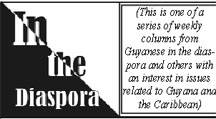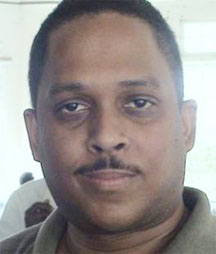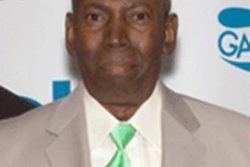In last week’s column, ‘Homosexuals, Dirty Words…and Me,’ award-winning US based Guyanese singer Nhojj spoke of the dangers of living in a world that can “never reflect the full spectrum of our lives,” cutting us off not only from each other but from parts of ourselves. This week, which draws together tributes generously shared by a number of people for this compilation, is for Robert Carr, Jamaican-Trinidadian-Caribbean activist whose journey consistently refused arbitrary and cruel divisions, and whose untimely passing in early May devastated so many in and beyond the region. As the Global Forum on Men Who Have Sex With Men (MSMGF) noted, “Robert’s work was grounded in compassion, dignity and justice for all – especially those whose rights were denied, whose health was undermined and whose sexuality was dismissed.”
 That level of compassionate engagement is poignantly captured in this story of Robert’s childhood and foundation in a loving family, offered by sociologist Christine Barrow, who co-authored a book on Sexuality, Social Exclusion and Human Rights with Robert and Marjan de Bruin:
That level of compassionate engagement is poignantly captured in this story of Robert’s childhood and foundation in a loving family, offered by sociologist Christine Barrow, who co-authored a book on Sexuality, Social Exclusion and Human Rights with Robert and Marjan de Bruin:
“In 1965, Robert, a young boy, 2 years old, was helping his father search for his car keys. He’d dropped them and thought they might be under the car. The conversation between them – I am told – went something like this:
‘Daddy, you lost something?’
‘Yes Robert.’
A pause as they continued the search under the car.
‘Daddy, you find it?’
‘No Robert.’
Another pause, the search continued. Then,
‘Daddy, what we looking for?’
And so from the young boy to the man. The story for me symbolizes Robert’s capacity to be there – volunteer to help…Wherever Robert was and whatever the time of day or night, there were emergency phone calls from persons who had been evicted from their homes and communities, who were victims of stigma, homophobia and the worst forms of violence. Robert would respond immediately and with his network of volunteers provide shelter, food, protection, whatever was needed.”

Robert Carr began advocating in Jamaica in 2000 against stigma and discrimination for persons living with HIV, and by 2002 had become Executive Director of Jamaica AIDS Support for Life. He was cofounder of the Caribbean Vulnerable Communities Coalition (CVC), which describes itself as a network of frontline service providers working on rights-based programming with marginalized groups across the Caribbean.
From 2005-2009 he worked at the Caribbean Institute for Media and Communication (CARIMAC) on the Mona Campus of the University of the West Indies. According to Marjan de Bruin, who was then CARIMAC Director, he spent “part of his time on his advocacy priority number 1 – getting the coalition of vulnerable communities off the ground – and part of his time on developing CARIMAC’s graduate programmes – especially the MA in communication for social and behaviour change….CVC was to become a unique powerhouse of people who had until then existed as ‘minorities’ in conditions of discrimination and often abuse – ‘spit’ out by the majority in the Jamaican society and wider Caribbean, drug abusers, prisoners, sex workers, people with a sexual orientation different from ‘the norm.’”
Robert was also an active member of a global community of HIV activists, one of the founders of MSMGF and served on the NGO delegation to the UNAIDS Programme Co-ordinating Board. At the time of his death, he was the Toronto-based Director of Policy and Advocacy at the International Coalition of AIDS Services Organizations (ICASO).
CVC has established the Robert Carr Advocacy Agenda and Fund, which will base its work on three principles that were key to Robert’s approach. The first is that human rights must be at the centre of the global HIV effort. Christine Barrow points out how Robert consistently challenged people to go beyond narrow responses to HIV, resetting “the conversation within a broader historical frame – of how the rhetoric of Caribbean independence, of ‘power to the people,’ had become derailed, how the human rights of marginalized people had been denied…he positioned the issues of poverty, governance and social protection firmly on the agenda.” There is a short clip on youtube of him speaking at a plenary at a Conference in Vienna last year, where he insists compellingly and with quiet force that “the narrowing of the focus of what needs to happen to a national AIDS control programme, even where that national AIDS control programme has become enlightened after years of advocacy, is quite frankly bull—— and it is completely unacceptable and we have to refuse to be constrained to a small department in a ministry while the rest of the government arrests us, the rest of the government refuses to acknowledge our partnerships, the rest of the government refuses to acknowledge the need for people to be able to visit their loved ones when they’re sick, because all of those things conspire to ensure that the work that we’re doing to reduce the infection will never be effective.”
The second element is that programmes must be responsive to community needs and community controlled and must allow for confrontation and activism. This is a critical principle to maintain, in a world of downsized social programmes, where communities are often left to compete with each other for funding, where donor monies tend to be project based and demand easily quantifiable results over a short time period, where it is difficult to get support that will guarantee institutional stability, and where external funding often means that one is struggling with an agenda set from above at the expense of engaging priorities set on the ground. At the memorial ceremony in Toronto Robert’s father, Peter Carr, who spoke movingly on behalf of the family, observed that his son was a creative genius who worked with and even within while refusing to be contained by the restrictive logic of bureaucracies. The CVC’s description of the Advocacy Agenda and Fund quotes Robert’s comments at an international panel, “Is AIDS Activism Dead?”
“If you really look concretely at what the HIV response is funding, what you see is a lot of workshops, for example, and a lot of documents being produced. Very often what is really needed is a different kind of strategy, a different kind of response. The ability to confront, the ability to be confrontational but to be supported in your confrontation, financially for example, so (we need) more human rights based activism.”
The third dimension is the commitment to unite vulnerable and marginalized populations locally, regionally and transnationally. In Guyana, the Society Against Sexual Orientation Discrimination (SASOD), which dedicated the May issue of its newsletter ‘Spectrum Vibes,’ to Robert’s life and work, had been a registered member of the CVC since 2006. Activists from Jamaica and St. Lucia spoke similarly in Toronto of Robert’s dedication to a grassroots Caribbean regionalism, and of his commitment to crossing linguistic boundaries in the Caribbean.
The tribute from the Global Forum on Men who have Sex with Men and HIV (MSMGF), observed that “he very much saw his work as being part of a broader movement for marginalized groups everywhere…[and] insisted that a unified front between gay men, other men who have sex with men, people who use drugs, sex workers, transgender people, and women was the best way forward for achieving health and rights for all.” Coalition-building demands integrity, and calls for a clear vision as well as the ability to know when to compromise. An indigenous woman in Canada once told me that compromise is the art of coming to a solution that all can live meaningfully with. Robert brought all of this to the table, summed up in MSMGF’s description of him as “a skilled negotiator and bridge-builder who never betrayed his principled stance on the core issues.”
He was an empathetic listener, described by Marcus Day of the CVC as someone “who did not seek to impress us with his big vocabulary or knowledge; he spoke with us as equals and encouraged us to not give up.” Perhaps the key was that his starting point and his unwavering commitment were non-negotiable: to those most marginalized by existing power structures.
Marjan de Bruin’s tribute to Robert at a celebration of his life held recently in Jamaica, closed with her observation that Robert’s move to Toronto in 2009 to work with ICASO was inspired “by the opportunity to spread his wings over the globe,” without relinquishing any of his deep love for and attachment to the Caribbean. She recalled that after a trip to Jamaica to reconnect with friends and spend time with his parents, Robert had begun to explore continuing his work at ICASO to which he was deeply committed but this time based in the region: “The prospect of having him back in town felt like the feeling that spring can give you, something very joyful, energizing, expecting to look forward to. We know now that this is not going to happen. My feeling is that we owe it to Robert to pick up from where he left and to start or continue, to fight the good fight and to keep the faith. That’s what Robert would have wanted.”
As Roberta Clarke, Regional Programme Director at the Caribbean Office, United Nations Entity for Gender Equality and Women’s Empowerment noted, ‘We will honour his life by achieving what he aspired towards. A Caribbean with heart, empathy, intelligence. A Caribbean free of the cruelty of ignorant stigma and discrimination. Or at the least, a Caribbean where laws are reformed to ensure that people are not criminalized for sexual orientation, where privacy and personal autonomy are respected, where people who live with HIV have redress from workplace discrimination and have access to decent health care services.”
A few times during the memorial in Toronto, as if by cue, a slight cool breeze wafted in through the windows, scattering all of the tributes laid out on a table where a candle burned and making everyone turn to see what was going on. One of Robert’s ICASO colleagues said wistfully, “Look, it’s as if Robert wanted us to know he’s here today.” Robert Carr’s dedication shows us what is possible, and is an example of Caribbean masculinity, indeed of Caribbean personhood, that will never fade away for as long as we commit to repeating it. It is the only way to keep his memory alive. This is not just consolation, but the gift of inspiration, put so well in this poem by Derek Walcott:
Star
If, in the light of things, you fade
real, yet wanly withdrawn
to our determined and appropriate
distance, like the moon left on
all night among the leaves, may
you invisibly delight this house,
O star, doubly compassionate, who came
too soon for twilight, too late
for dawn, may your faint flame
strive with the worst in us
through chaos
with the passion of
plain day
Derek Walcott, The Gulf and Other Poems, 1969









